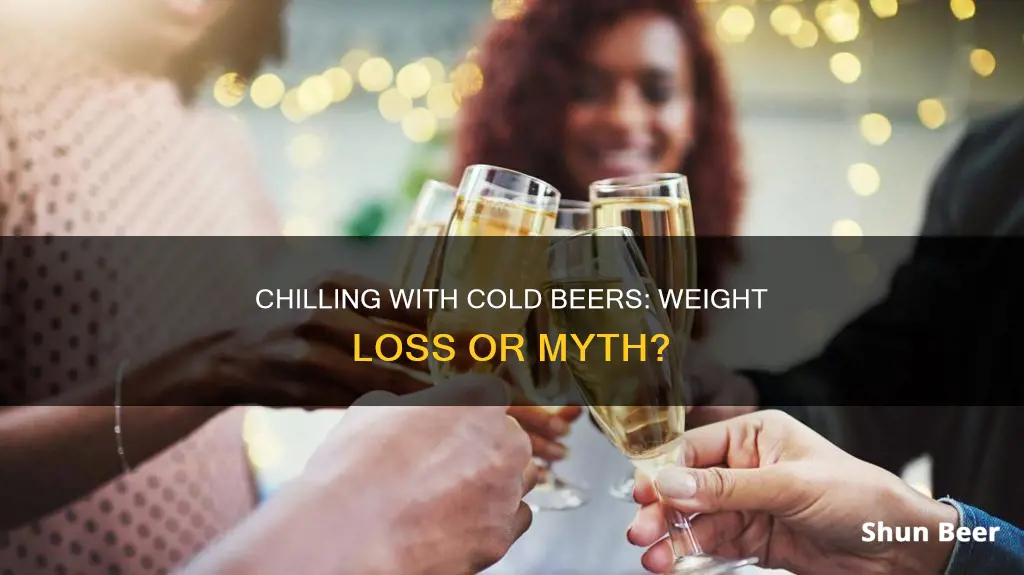
Drinking beer is deeply entrenched in our culture as a way to relax and have fun. However, it is common knowledge that beer drinkers tend to have large, round bellies, and this is often attributed to the high calorie content of beer. A typical beer has around 150 calories, and since these are empty calories, drinking beer can cause weight gain. This is because beer provides calories without satisfying hunger, and it is easy to drink a lot of calories very quickly. In addition, alcohol affects the way the body metabolises fat, and can also negatively impact sleep and self-control, making it harder to maintain a calorie deficit.
| Characteristics | Values |
|---|---|
| Calories | Beer contains a lot of calories, with an average of 150 calories per beer. |
| Empty Calories | Beer is often referred to as "empty calories" as it provides the body with calories but very few nutrients. |
| Metabolism | Alcohol is burned first as a fuel source before carbohydrates or fats, which can lead to weight gain. |
| Sleep | Alcohol can negatively impact sleep, which is linked to weight gain and muscle loss. |
| Self-Control | Alcohol can lower inhibitions and increase the urge to eat more food. |
| Liver | Excess alcohol consumption can lead to alcoholic fatty liver, which can damage the liver and affect the metabolism of carbohydrates and fats. |
| Belly Fat | Alcohol is associated with bigger waists and belly fat, possibly due to the liver burning alcohol instead of fat. |
What You'll Learn

Beer is an empty calorie drink with almost no nutrients
Beer is an "empty calorie" drink, meaning it provides almost no nutrients to the body. The calories in beer come primarily from alcohol, with a small contribution from unfermented carbs and protein. Alcohol is metabolised differently from other macronutrients like protein, carbs, and fat. When you consume alcohol, your body prioritises burning it as a fuel source before anything else, which can completely stop the process of fat burning. This is why drinking beer can make losing weight difficult.
The challenge with drinking beer is that it provides calories without satisfying hunger. Beer is a liquid, which means you can consume calories very quickly, and it does not fill you up. If you drink five beers (around 750 calories), you will still have room in your stomach for a full meal. This is why drinking beer is linked to weight gain.
Beer is also often consumed in social settings, where the food on offer is typically high in fat and calories, such as pizza, wings, and fried foods. Alcohol lowers inhibitions, making it harder to resist these tempting food choices. Additionally, alcohol can affect your sleep, leading to weight gain and muscle loss. Lack of quality sleep is directly linked to weight gain, and one study found that people who slept for 5.5 hours instead of 8.5 hours lost 50% of their weight from muscle.
The term "beer belly" exists for a reason. While any excess calories can contribute to belly fat, alcohol seems to have a particular association with fat accumulation in the midsection. This is because when you drink alcohol, your liver burns alcohol instead of fat. As a result, excess calories are stored as fat, and your body tends to accumulate this fat in the abdominal area.
To summarise, beer is considered an empty calorie drink because it provides minimal nutrients while contributing significant calories, primarily from alcohol. This can hinder weight loss efforts by disrupting fat burning, increasing overall calorie intake, impairing sleep, and promoting poor food choices. The association between alcohol consumption and belly fat further emphasises the impact of beer as an empty calorie drink on weight management.
Expired Beer: Is It Safe to Drink?
You may want to see also

Beer is a liquid, meaning it's easy to consume a lot of calories quickly
Beer is a liquid, and this means it is easy to consume a lot of calories quickly. Beer is often referred to as "empty calories" as it provides your body with calories but very few nutrients. A typical beer contains around 150 calories, and if you drink several in one sitting, you can quickly exceed your daily calorie intake.
For example, if you drink five beers, that's around 750 calories, and you will still have room in your stomach for a full meal. This is why drinking beer can make losing weight difficult. It is a liquid, so it doesn't fill you up, but it is calorific.
Beer is also often drunk in social situations, and the food on offer is often high-calorie, fatty fare such as pizza, wings, and fried food. Beer is also usually served in large measures, and it is easy to drink a lot in one sitting.
Beer is also often drunk in addition to a meal, rather than as a substitute, so the calories from the beer are on top of the calories from food. As beer is a liquid, it is easy to forget that it contains calories and that these calories quickly add up.
Beer is also often drunk quickly, and this means it is easy to drink a lot in a short space of time, consuming a lot of calories very fast. The liquid nature of beer means it is easy to drink a lot without realising, and the calories can quickly add up.
If you are trying to lose weight, it is important to be aware of the calorie content of beer and to drink in moderation. Light beers or low-percentage ABV beers are a good option, and drinking less frequently, such as only on weekends, can help.
Beer and Loratadine: Safe Mix or Health Risk?
You may want to see also

Alcohol is metabolised differently by the body to other macronutrients
Alcohol is often referred to as "empty calories" because it provides the body with calories but contains very few nutrients. A typical beer contains around 150 calories, and if you drink several in one sitting, you can end up with a serious calorie overload.
The alcohol content of beer is expressed as a percentage of alcohol by volume (% ABV). All else being equal, the higher the ABV, the higher the calories. So, when trying to lose weight, it is recommended to drink light or low % ABV beers.
Additionally, alcohol can affect your liver, which plays a crucial role in metabolising fats, carbohydrates, and proteins. Excess alcohol consumption can lead to alcoholic fatty liver, which can damage the liver and affect how your body metabolises and stores carbohydrates and fats.
The Magic of Beer Guns: Filling and Foaming Perfection
You may want to see also

Beer negatively affects sleep quality
Drinking beer, especially in large quantities, can negatively affect sleep quality. Alcohol is known to have a sedative effect and can help people fall asleep more easily. However, it can disrupt sleep later in the night, leading to frequent awakenings and poor sleep quality overall. This is because alcohol affects the body's sleep architecture, suppressing REM sleep in the first half of the night and increasing it in the second half. This disruption to the sleep cycle can cause people to feel tired the next day and may contribute to sleep disorders such as insomnia and sleep apnea.
Several studies have found a link between alcohol consumption and poor sleep quality. One study of 234 men and 159 women found that men with higher alcohol dependency scores tended to suffer from poorer sleep quality. Another study of 42 recovering alcoholics and 42 controls found that the alcoholics had less slow-wave sleep and more REM sleep than the controls, indicating a disruption in their sleep architecture.
The negative impact of alcohol on sleep can be both acute and chronic. Acute effects include decreased sleep onset latency and changes in sleep architecture, while chronic effects include lower slow-wave sleep and more REM sleep, which can last long into periods of abstinence. Additionally, heavy alcohol use can contribute to the development of insomnia, and people with insomnia are at an increased risk of developing alcohol use disorder.
To maintain good sleep quality, it is recommended to avoid alcohol at least three hours before bedtime. This may need to be extended for those who are particularly sensitive to the effects of alcohol or who consume multiple drinks in a short period.
Does Your Growler Still Offer Fresh Beer?
You may want to see also

Beer may reduce self-control, leading to poor food choices
Beer is deeply ingrained in our culture as a way to unwind, have fun, and socialise. However, it is important to understand the impact it can have on our self-control and subsequent food choices. When we drink beer, our inhibitions tend to lower, and we may find ourselves making food choices that we wouldn't normally make. This is because alcohol affects our judgment and can lead to poor decision-making, especially when it comes to food.
Several factors come into play here. Firstly, beer provides us with "empty calories". This means that while it gives our body calories, it contains very few nutrients. These empty calories can quickly add up, especially when we consider that a typical beer has around 150 calories. If we drink several beers in one sitting, we can easily exceed our daily calorie limit without even realising it.
Secondly, alcohol is metabolised differently by our bodies compared to other macronutrients like protein, carbohydrates, and fat. When we consume alcohol, our body prioritises burning it as a fuel source before using anything else. This means that the excess glucose and lipids from the food we eat can get stored as adipose tissue or fat. This can lead to weight gain and specifically contribute to the accumulation of belly fat, often referred to as a "beer belly".
Additionally, drinking beer can increase our appetite. When we drink, we often crave fatty, fried foods like pizza, wings, and chips. These foods are usually readily available at bars or parties, making it even more challenging to resist temptation. The combination of increased appetite and lowered inhibitions can lead to overeating and poor food choices.
Moreover, alcohol can trigger hunger signals in our brain, as seen in animal studies. So, even if we are usually disciplined with our diet, it becomes much harder to say no to that extra slice of pizza or a late-night kebab when we've had a few beers.
Finally, drinking beer can negatively impact our sleep. Lack of quality sleep is directly linked to weight gain and muscle loss. When we don't get enough restful sleep, our bodies experience an increase in the hormones related to hunger and a decrease in the hormones related to satiety, leading us to make poor food choices and overeat.
In conclusion, while beer may not be the sole cause of weight gain, its impact on our self-control and decision-making can lead to poor food choices that contribute to weight gain. To maintain a healthy weight, it is important to be mindful of our beer consumption and make conscious choices about the food we eat when drinking.
Morning Beer: Should You Drink Before Work?
You may want to see also
Frequently asked questions
No, drinking cold beers does not make you lose weight. Beer is often referred to as "empty calories", providing your body with calories but very few nutrients. Alcohol also affects your liver, which can change the way your body metabolises and stores carbohydrates and fats.
Beer is challenging for weight management as it contributes a lot of calories. A typical beer has around 150 calories, and drinking several in one sitting can lead to a serious calorie overload. Beer also negatively affects your sleep, which is linked to weight gain and muscle loss.
While it is harder to lose weight while drinking beer, it is not impossible. You can reduce your calorie intake by drinking light or low-percentage ABV beers, reducing your portion sizes, and drinking less frequently.
A "beer belly" is a term used to describe the accumulation of fat in the midsection, often associated with drinking beer. This is because alcohol calories are easy to overdo, and the liver burns alcohol instead of fat. However, any excess calories, not just from alcohol, can increase belly fat.







